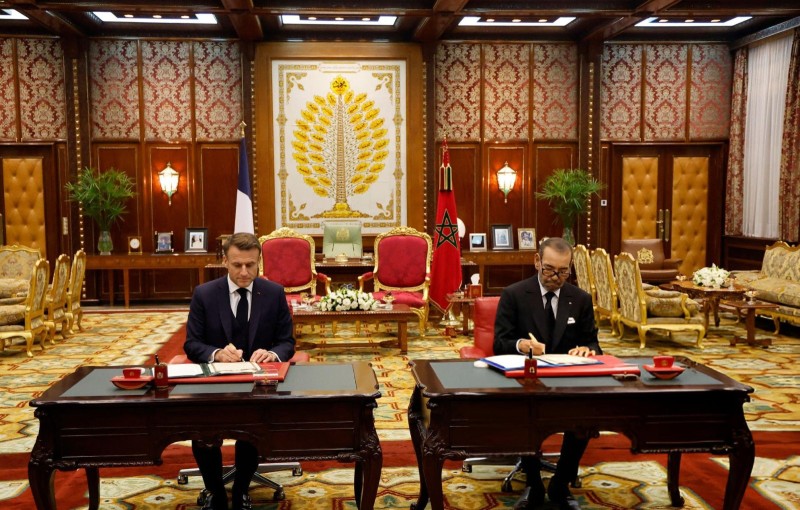
Rabat – In a significant step toward deepening Franco-Moroccan relations, Morocco and France signed 22 new agreements in Rabat today, solidifying a robust partnership across sectors ranging from energy and transport to culture and education. The agreements were signed in the presence of Morocco’s King Mohammed VI and French President Emmanuel Macron, underscoring the shared commitment to economic, technological, and environmental progress.
Key Deals Boost Rail and Transport Advancements
Among the notable agreements was a contract between Morocco’s National Railways Office (ONCF) and French multinational Alstom to supply high-speed trains and provide ongoing support. This project aligns with Morocco’s goal of modernizing its transportation infrastructure, following the successful launch of the Casablanca-Tangier high-speed train line in 2018. Additional contracts were signed between ONCF and Sistra Egis for technical consulting and with Goslo Cogifer for essential rail components, further reinforcing Morocco’s ambition to enhance its rail network with French expertise.
Green Energy Partnerships for a Sustainable Future
Morocco and France solidified their mutual vision for sustainable energy with agreements involving TotalEnergies and Safran, as well as a partnership between Morocco’s OCP and the French Development Agency (AFD) focused on decarbonization. These initiatives are part of Morocco’s ambitious goal to produce 52% of its electricity from renewable sources by 2030, while also reducing greenhouse gas emissions by 45% and moving away from coal power.
A prominent component of the energy collaboration includes the expansion of Morocco’s Taza wind farm, emphasizing both nations’ commitment to green energy solutions.
The agreements also cover critical areas like civil protection, water resource management, and agriculture, with both countries recognizing the importance of sustainable development and resource management in response to climate challenges. France’s expertise in these fields will contribute to Morocco’s efforts in these essential areas, particularly in addressing pressing environmental and infrastructure needs.
Education, Culture, and Digital Innovation Highlight Broader Collaboration
On the education front, Morocco and France signed a cooperation declaration for 2024-2026, strengthening academic partnerships and promoting research collaborations between universities in both nations. France remains the most popular destination for Moroccan students, with over 45,000 Moroccan nationals enrolled in French institutions in 2023.
The two countries also emphasized cultural and creative industry collaboration, extending to cultural heritage preservation, digital innovation, and video game development. These agreements reflect a broader approach to partnership, encompassing digital and creative industries alongside traditional sectors.
Trade between France and Morocco has seen significant growth, reaching €14.1 billion in 2023, largely driven by Morocco’s automotive exports and France’s transport and agricultural imports, including grain—a vital commodity for Morocco’s food security amid global disruptions from the Ukraine conflict.
The two countries further solidified their economic relationship with the launch of the Morocco-France Investment Accelerator, aimed at promoting cross-border investment and economic opportunity. France continues to be Morocco’s largest foreign investor, with investments in sectors like real estate, industry, commerce, and finance. In turn, Morocco has become the leading African investor in France, with Moroccan foreign direct investment reaching €1.8 billion in 2022, covering industries from high-level decision-making centers to shared economic projects.
Strengthening an Enduring Alliance
France and Morocco’s renewed commitment through these agreements marks a pivotal moment for both nations, reinforcing a multifaceted partnership that extends beyond economic cooperation to encompass cultural, environmental, and educational collaboration. With their shared vision for progress, Morocco and France remain influential allies in North Africa and Europe, poised to tackle shared challenges and seize opportunities for growth across diverse sectors.




